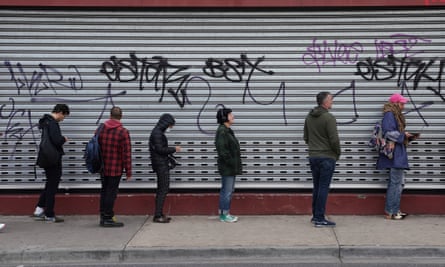Extract from The Guardian
After months of being given the runaround, I received a temporary exemption. It turns out I was entitled to it all along.

Last modified on Mon 31 Aug 2020 16.17 AEST
In March I finished up a fixed-term contract as a writer and editor for an arts media outlet. Soon after, the pandemic shut down much of the sector. Plays that I’d been booked to review were cancelled. Exhibitions that I’d been commissioned to write catalogue essays for were postponed. Editors I pitched to said their budgets were frozen.
I didn’t think I’d be eligible for jobkeeper because I’d only just returned to freelancing, so I applied for jobseeker. I started getting payments in April, along with emails telling me to sign a job plan.
The job plan outlined my compulsory mutual obligation requirements: I had to attend appointments with a job service provider, contact employers as directed by the provider, report evidence of my job search efforts, and various other obligations. “I am aware that I need to look for any suitable work, not just work that I would like to do”, the plan said.
Obviously I wasn’t keen on the prospect of abandoning the career that I’ve devoted my life to, but the emails from the department made it sound like I didn’t have the option to refuse, so I signed.
The job service provider I was assigned to didn’t have any understanding of the arts sector, the media industry, or my career prospects. I tried to explain that I was constantly pitching to editors and applying for grants, fellowships and residencies – with some success – but none of that helped me meet mutual obligation requirements.
I asked if the job provider could help me with expanding my client base for copywriting, proofreading or transcribing – just a few of the side hustles I’ve developed in the endless pivot that is journalism today – and it told me it didn’t do that. It only deals with “jobs”.
But work in Australia is increasingly insecure – freelance, part time, casual, contract – especially in arts and media. When every other week comes with announcements of mass redundancies in the media, the likelihood that I’ll find a full-time job as a writer is low. It seems sensible that I would try to patch together a livelihood as a freelancer instead.
While I’ve been on jobseeker, I have been constantly working and looking for work, but none of it counts towards mutual obligations. Neither does any of my volunteer work.
I know that it’s hard to make a living as a writer. That’s why I also do editing, proofreading, transcribing, copywriting, audio production, web design, public speaking, and consulting. I’m not fussy about accepting gigs: I write news and features, arts criticism, political opinion, lifestyle columns, listicles, but also résumés and grant applications. I’ll write you a break-up text if you hire me. With more and more podcasts and online events popping up as lockdown continues, I’ve been building my transcription business and learning how to provide captioning services. I think I’m pretty realistic about my career. I know my industry, and I know what to do to improve my prospects.
It’s frustrating and humiliating discussing my career with someone at a job service provider who seems wholly uninterested in understanding my situation. It’s even more infuriating when I remember that the government spends about $1.3bn a year paying for this. In 2018-19, job service providers reaped more than half a billion in bonuses when their clients found work, even when the client said that the provider was more hindrance than help. That’s the real welfare scam – yet many taxpayers seem unfazed that these providers are paid to demoralise and punish the unemployed, waste their time, and obstruct their search for work.
Eventually, after months of calling Centrelink and being given the runaround, I received a temporary exemption from mutual obligations. It turns out I was entitled to an exemption all along – thanks to the Australian Unemployed Workers Union, I was alerted to a news item on the Centrelink website that stated: “If you’re a sole trader or self-employed, you don’t have to meet mutual obligation requirements. This is so you can work to restart your business.” Yet no one I had spoken to at Centrelink was aware of this.
I’m fortunate that I know how to wade through policy documents, navigate bureaucracy, and advocate for my rights. Given my education and work experience, I’m better placed to negotiate than many others. I’m spared the worst of this system. But it still disgusts me to see how it’s designed around suspicion and disdain rather than aid.
As unemployed people have been saying for decades, the mutual obligation system is pointless, punitive and counterproductive. It’s a waste of time and money. It does nothing to help people find work. It’s just a complicated, expensive way of penalising people for being poor.
This farcical process of making people jump through hoops for sport is even more sadistic in the context of a pandemic and a recession, when there are far more unemployed people than there are jobs. There’s nothing mutual about these obligations, and it’s time to put an end to this nonsense.
• Jinghua Qian is a writer, editor and arts critic
No comments:
Post a Comment